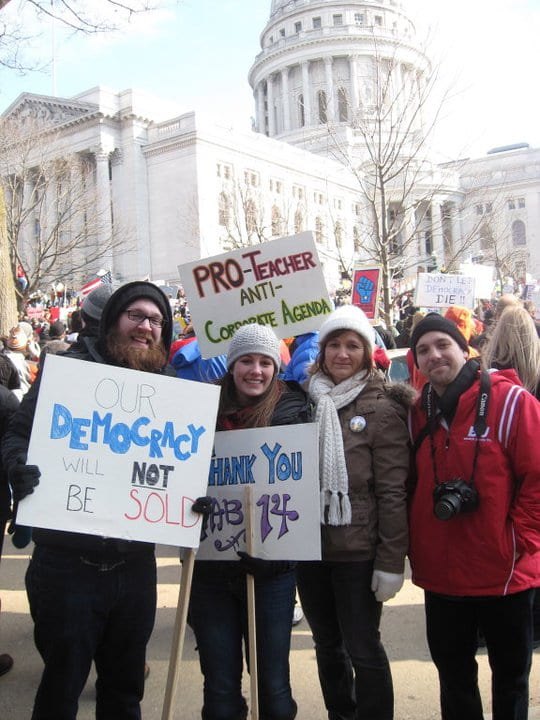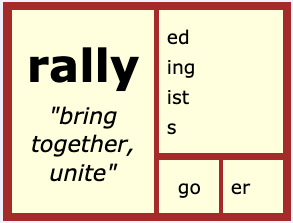There was quite a hub-bub about the campaign rally scheduled recently in Oklahoma. Several current medical and social issues caused this rally to be questioned more than most political rallies in our past. And of course, the whole event got me thinking about the word ‘rally.’ A political rally is nothing new in this country. I believe the first political rally was held by George Washington when he was running for his second term! Prior to his political campaign and the rallies that took place to support that, he often had a need for rallies of a slightly different type. Accounts of the battles indicate that there were many times during the American Revolution when the soldiers needed to hear words of encouragement from their leader. They needed to be brought back together and reminded of what was at stake in that war. They needed a pep talk of sorts. Other times during the conflict, they needed to be rallied (brought back together) so that they were ready for the next advance.

Washington inspecting the colors after The Battle of Trenton by Edward Percy
Moran [Public domain], via Wikimedia Commons
The idea of pulling a group of people together to encourage them to think in a certain way was what the word ‘rally’ meant then, and it is what the word means now! You may be familiar with the phrase “Rally ‘Round The Flag.” That is a line from the Civil War era song, “Battle Cry of Freedom.” Here is a link to the story of this song. It was written days before it was played on July 24, 1862 at a huge war rally held by Abraham Lincoln, who was trying to recruit as many as 300,000 volunteers to fight for the Union. This article includes the words to the song and a version of the song.
Civil War Music: The Battle Cry of Freedom

Of course there are rallies that are not political in their intent. Most everyone who has attended a secondary school with a sports team has attended a pep rally! They are especially commonplace in the U.S. I’m not sure about other countries. The goal of a pep rally is to stir up some school spirit! There is music by the school’s pep band, there is chanting by the school’s cheerleaders, and there is lots of encouragement offered to the members of the particular sporting team being featured.
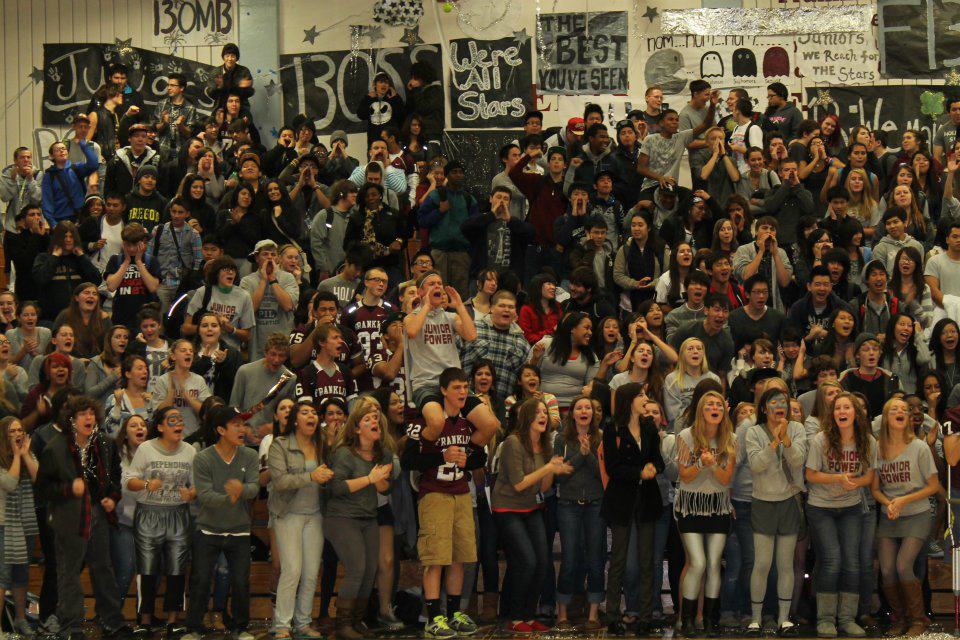
CC BY-SA 3.0 Pepassemblyatschool.jpg by Jesrapo
What else is there to know about this word?
At Etymonline we see that this word was used as a verb (1600) before it was used as a noun (1650). The verb meant “bring together.” Before that it was from French rallier, and before that from Old French ralier “assemble, unite again.” As you can see the original sense and meaning of this word persists today! Looking closer at the etymology of this word, we see <re-> “again” and alier “unite.” At this point in the Etymonline entry we are directed to the related word ‘ally.’ That word is first attested in the late 13c. Notice that it is older by 300 years! At that time it meant “to join in marriage.” Further back it was from Old French alier “combine, unite.” Notice the spelling difference between Old French ralier and Old French alier! The only difference is the <r> which represents the <re-> prefix “again.”
Before I go further, I just want to mention how much I love the fact that ‘rally’ and ‘ally’ have a common ancestor! Think about the word ‘ally’ for a minute. We think of our allies as those who join us and work with us for the mutual benefit of both. According to Etymonline, ‘ally’ has had a sense of “form an alliance, join, associate” since the late 14th century. We saw certain nations become allies in both World War I against the Central Powers and then against Germany, Japan, and Italy in World War II. It is not a stretch to think that once you form an alliance with someone or some group, the two people or groups are now allies. And who better to rally with than your allies!
The Oxford English Dictionary lists several variations of this first sense of this word. The first is “a rapid reassembling of forces for renewed effort or fighting.” That is certainly the same sense we see in accounts of war. While reading an account of the Battle of Trenton (American Revolution) at the History Channel site, I came across the following use of this word:
“Rall attempted to rally his troops but was never able to establish a defensive perimeter, and was shot from his horse and fatally wounded.”
A second variation is that of a “signal for rallying.” In order for the soldiers to know they are to rally, there must be some kind of signal. A commander might tell someone to sound the rally! It was no doubt a specific bugle or drum signal.
A third variation would be “a meeting of the supporters of a cause to demonstrate the strength of public feeling or to inspire or foster enthusiasm.” My New Oxford American Dictionary describes this sense as “assemble in a mass meeting.” I would venture to say that people the world over have seen or participated in such mass meetings in the last year. Recently there have been (and continue to be) protests/rallies for causes like Black Lives Matter. Earlier this year there were protests or rallies for Climate Change as well. I imagine you could name several rallies that you’ve seen in the news with other particular focuses. I remember participating in a rally myself back in 2011!
A fourth variation would be in the context of boxing. The word would be used to mean “a sustained exchange of blows.” I went to Google to find ‘rally’ used in this way in a recent headline or story. I found, “Boxers Rally to Defeat Willamette” from September, 2018. But on closer examination, this story is about a volleyball team who rallied (to come together to restore spirits and enthusiasm). As you no doubt noticed, instead of finding this word used with this sense as a noun, I found it with another sense as a verb. The next headline I found was, “Boxers Rally for Win in Home Opener.” Again, this had nothing to do with boxing. It was about baseball which you may have guessed from the phrase ‘home opener.’ The third headline I found was actually about boxing! “Boxing World Rallies Against Devin Haney for …” In this story, one boxer had made a blatantly racist remark against another and a large number of boxing enthusiasts rallied (came together to send a solid message). So I was unlucky in finding an example of this word used in this sense as a noun at all. I wonder if it is because there is a more commonly used word for this particular sense. I’m thinking of the word ‘volley.’ I could easily find reference to a boxer receiving “a volley of well-placed blows.”
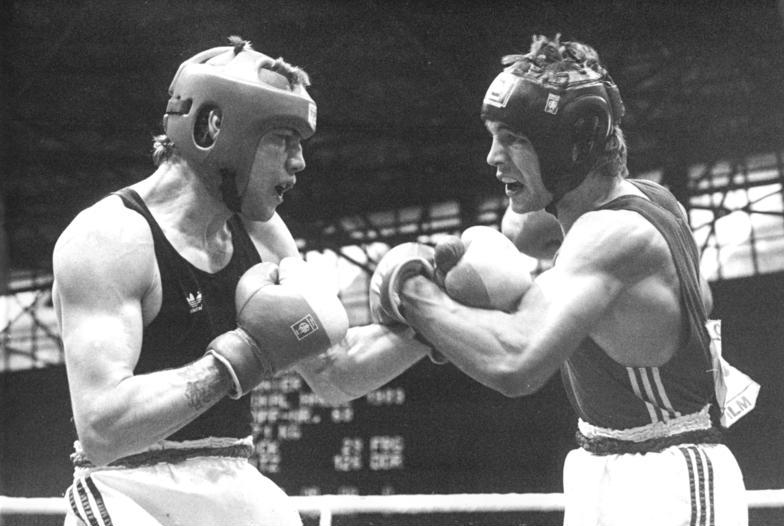
Michael Gusnick, Torsten Schmitz by Thomas Lehmann
Bundesarchiv, Bild 183-1989-0325-010 / Lehmann, Thomas / CC-BY-SA 3.0 /
CC BY-SA 3.0 DE (https://creativecommons.org/licenses/by-sa/3.0/de/deed.en)
A fifth variation would be “a concerted effort by a team, player, or competitor, especially one made from a losing position to draw even or take the lead.” This sense applies to the sporting headlines I found in the previous paragraph! Many times a team or player rallies with the hopes of coming from behind to win. At the site The Bleacher Report, I found this list: The 20 Most Outstanding Sports Team Rally Songs. One of my favorites off that list is “New York, New York” which is a rally song for the New York Yankees. Do you know it? It became popularized by Frank Sinatra.
Now an obviously different sense of ‘rally’ has to do with car racing. A rally is “a race for motor vehicles, usually over a long distance on public roads or rough terrain and typically divided into several divisions.” The Sports Car Club of America describes a RoadRally this way: “Because events do not involve speed, teams do not need specialized equipment for their car. Although there are classes for vehicles with RoadRally-specific equipment on them, often teams will do the events with only pens, paper and a wristwatch. On the rare occasion the RoadRally is held at night, a small flashlight might be needed. Entry fees for the events are typically less than $40, and often events will even have classes for RoadRally novices.”
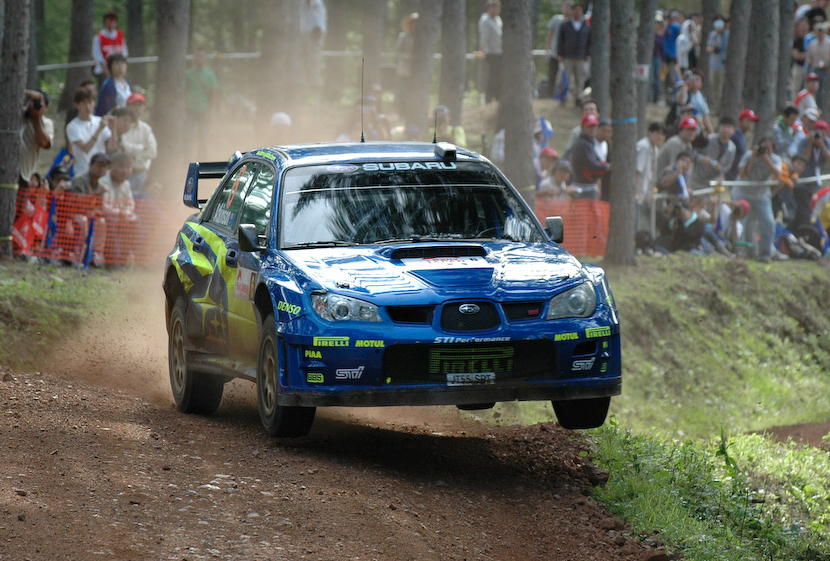
By oisa – https://www.flickr.com/photos/oisa/763487574/, CC BY 2.0,
https://commons.wikimedia.org/w/index.php?curid=2684357

London Maximillion Jaguar XJ220 leaving the start in London in 2007
In referring to a rally, but wanting to switch the word to a verb, one could say, “The driver rallied his car in Italy.”
There are just so many interesting words within our reach every single day. Even when you think you understand a word, there is always something new to discover. There is always a deeper understanding to gift to yourself! I also find that with every investigation I conduct on my own, I become more and more familiar with my resources and what the internet can make available to me. I prefer to use more than one resource simply because each is written by a different person, and in doing their own digging for the information, may have come across different resources themselves. More information is always clarifying! When there are discrepancies, it just means I need to look further and think about what information I need to know in order to reconcile the discrepancies I see. Sometimes the discrepancy is simply my misunderstanding of linguistics and language. So I ask questions of knowledgeable people and I reread trusted sources.
Don’t forget to conduct your own investigations. The more often you do it, the better equipped you are to teach others how to go about an investigation. I have found that the more discoveries I have made for myself, the less I want to “make things easy” for my students. If I enjoy the moments of discovery this much, why would I rob my students of the same joy? I guide them, I lead them, I help them understand the signposts along the way, but I let them see it for themselves! And everyday we rally around words!

